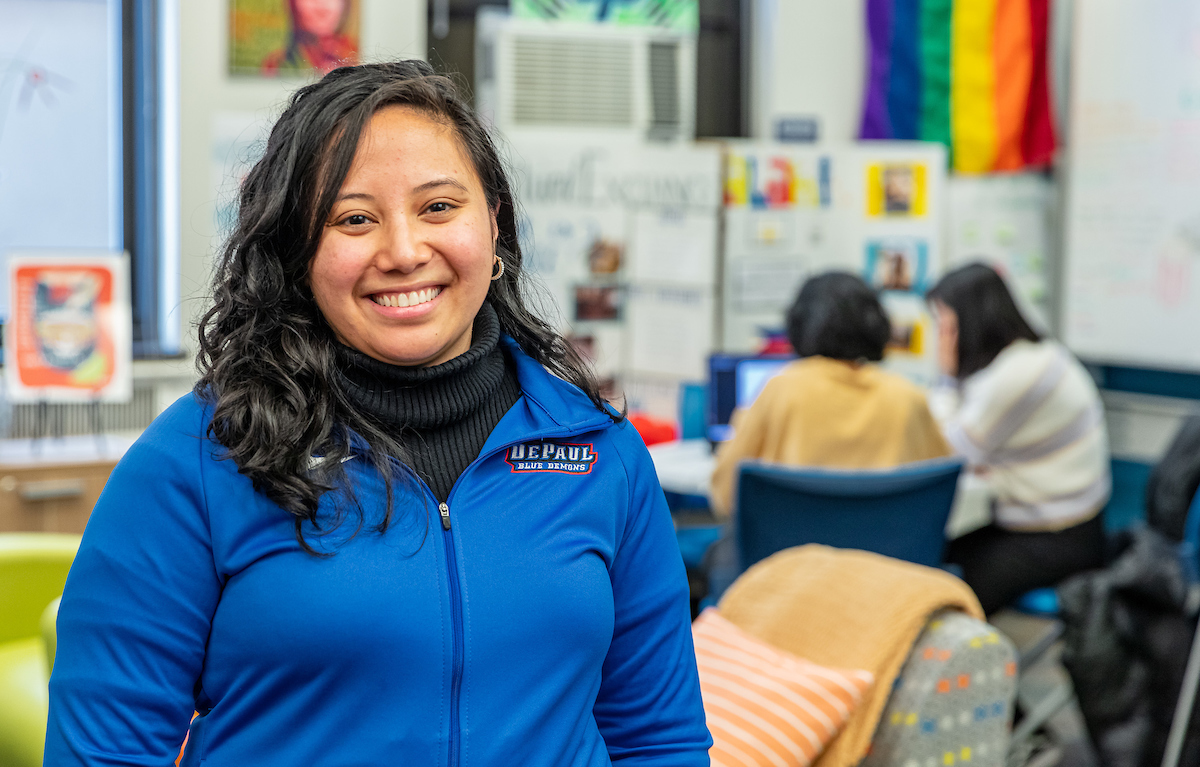 Jane Baron serves as the coordinator for DePaul's Asian Pacific Islander Desi American Cultural Center. (DePaul University/Randall Spriggs)
Jane Baron serves as the coordinator for DePaul's Asian Pacific Islander Desi American Cultural Center. (DePaul University/Randall Spriggs)[Editor's Note: Newsline asked the coordinators of DePaul's four cultural resource centers to introduce their programs to the university through a question-and-answer exchange. The final of these articles looks at the APIDA Cultural Center. The questions are Newsline's; the answers are those of the coordinator, Jane Baron.]
How would you describe the role that the APIDA Cultural Center plays in the life of the university?
As one of its top strategic goals, DePaul is committed to becoming a model of diversity. The Asian Pacific Islander Desi American Cultural Center supports that strategy. With our current enrollment of Asian American students around 10%, we are eligible to apply to be an Asian American and Native American Pacific Islander-serving institution, which means we can receive funding to serve our APIDA students.
The role of the center is to connect APIDA-identified students with community resources to increase their sense of belonging at the university. Research links a sense of belonging to increased persistence to graduation. The APIDA Cultural Center creates a space for students to discuss identity, build community and create systems of support to achieve personal, academic and professional success.
What are some of the unique opportunities available to students, faculty and staff only through the Cultural Center?
The center provides a space for the DePaul community to appreciate and learn about lived experiences in the APIDA community. One of my goals as coordinator is to create a network of intergenerational support across students, faculty and staff.
I've heard personal anecdotes from students about wanting to connect with faculty and staff who resonate with their lived experiences. As a staff member, I have the unique opportunity to connect students with employees who can serve as a resource.
Additionally, the APIDA Cultural Center is a co-created space, where students can also express and be experts of their personal identity development that can inform faculty and staff about ways to further support students.
What role does the Cultural Center play in expanding the education that DePaul provides?
The APIDA Cultural Center, along with the other Cultural and Resource Centers, plays a role in creating a culturally engaging campus at DePaul. To engage and support students with marginalized identities, the university needs to intentionally shape learning environments to foster students' sense of belonging and affinity to DePaul. The center creates a co-curricular space where students can express what resources they need to feel successful about their progress through graduation. In the future, I hope to gather this data and present it to the university to inform policies and best practices to expand education at DePaul.
What types of social programs do you offer at the Cultural Center for community members?
Events and programs offer opportunities to meet, network and build community within DePaul. Our student staff lead and organize events, like Game Nights and Cha(i) Time, that center around community and social engagement. For the next academic year, I am working on creating spaces where students, faculty and staff can network at events to foster intergenerational support.
In addition to smaller social programs, the center also hosts events that offer DePaul community members an opportunity to learn about the diverse cultures within the APIDA diaspora. This winter we hosted Lunar New Year celebrations, as well as a Festival of Lights, where student organizations showcased games played in their cultures.
How has the Cultural Center gone about developing a distinctive learning community within the broader university?
Our program and events are created to raise awareness about the experiences of the APIDA diaspora. In particular, the center works with multiple partners during APIDA Heritage Month to invite the DePaul community to learn about the APIDA diaspora's history, complexities and intersectional identities.
Jane Baron is the coordinator for DePaul's Asian Pacific Islander Desi American Cultural Center
Read the other articles in the cultural center series: